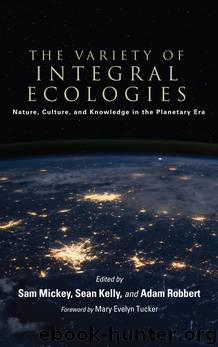The Variety of Integral Ecologies by Sam Mickey Sean Kelly Adam Robbert

Author:Sam Mickey,Sean Kelly,Adam Robbert [Sam Mickey,Sean Kelly,Adam Robbert]
Language: eng
Format: epub
ISBN: 9781438465272
Publisher: State University of New York Press
Published: 2017-01-15T07:00:00+00:00
8
FIVE PRINCIPLES OF INTEGRAL ECOLOGY
Sean Kelly
A LOOMING MASS EXTINCTION of species the likes of which has not been seen in 65 million years, global climate change, habitat loss, diminishing supplies of fresh water and topsoil, disappearing forests, polluted and overfished oceans, increasing desertification: all are the result of human choices and destructive ways of life. The sciences of ecology, which study the relations of organisms to their environments, clearly have an essential role to play in understanding and attempting to ameliorate the mounting crises we face. The gravity and complexity of these crises, however, call for integral approaches to the theory and practice of ecology. The word integral here suggests, to begin with, that ecology is relevant to the full range of human knowledge and action. All human endeavor—from food production and resource use to economics, politics, and education—needs to be ecologized, in the sense that implications for the fate of the entire Earth community need to be considered. Conversely, ecology needs to draw from the whole spectrum of human inquiry, not only from the natural sciences, but from the human and social sciences, from the world’s spiritual traditions (Eastern, Western, and indigenous), and from collective wisdom and individual insights.
While the sciences of ecology have already contributed to a more holistic, and in this sense, more integral understanding of the natural world and of the relation of organisms (including human beings) to their environments, the general trend has been toward ever-increasing specialization, disciplinary fragmentation, and an exclusive focus on material interactions and external relations. Outside scientific ecology proper, this trend has been somewhat compensated for with the emergence of a growing number of hybrid approaches, including political ecology, social (and socialist) ecology, deep ecology, feminist ecology, spiritual ecology, and most recently Sean Esbjörn-Hargens and Michael Zimmerman’s (2009) impressive proposal for an “AQAL” (“all quadrants, all levels”) system of integral ecology, based on the work of integral theorist Ken Wilber. This Wilberian system (a detailed presentation of which appears in the third chapter of this book) involves a conceptual mandala that superimposes four quadrants (interior/exterior and individual/collective) on the traditional three levels of body, mind, and spirit. Its notable virtues include an easily mastered map of the multiple terrains of ecological theory and practice; an explicit recognition of the importance of interiority (for all organisms, not just human beings); a coherent articulation of ecological or environmental ethics; and a robust view of the nature of evolution and human development, including its spiritual dimensions.
Alongside these and doubtless other virtues, however, certain aspects of the AQAL system could meet resistance among those otherwise sympathetic to the idea of an integral ecology. Some representatives from the various schools of ecology might not recognize themselves as they are characterized, and categorized, within the system, mostly confined as they are to a single quadrant (and sometimes to a subquadrant) and level. A danger here, for both categorizer and categorized—and this despite the real care taken by Esbjörn-Hargens and Zimmerman (2009) to honor the perspectives they attempt
Download
This site does not store any files on its server. We only index and link to content provided by other sites. Please contact the content providers to delete copyright contents if any and email us, we'll remove relevant links or contents immediately.
| Anatomy | Animals |
| Bacteriology | Biochemistry |
| Bioelectricity | Bioinformatics |
| Biology | Biophysics |
| Biotechnology | Botany |
| Ecology | Genetics |
| Paleontology | Plants |
| Taxonomic Classification | Zoology |
Sapiens: A Brief History of Humankind by Yuval Noah Harari(14367)
The Tidewater Tales by John Barth(12651)
Mastermind: How to Think Like Sherlock Holmes by Maria Konnikova(7320)
Do No Harm Stories of Life, Death and Brain Surgery by Henry Marsh(6934)
The Thirst by Nesbo Jo(6932)
Why We Sleep: Unlocking the Power of Sleep and Dreams by Matthew Walker(6701)
Life 3.0: Being Human in the Age of Artificial Intelligence by Tegmark Max(5547)
Sapiens by Yuval Noah Harari(5365)
The Body: A Guide for Occupants by Bill Bryson(5080)
The Longevity Diet by Valter Longo(5058)
The Rules Do Not Apply by Ariel Levy(4957)
The Immortal Life of Henrietta Lacks by Rebecca Skloot(4573)
Animal Frequency by Melissa Alvarez(4459)
Why We Sleep by Matthew Walker(4434)
The Hacking of the American Mind by Robert H. Lustig(4375)
Yoga Anatomy by Kaminoff Leslie(4358)
All Creatures Great and Small by James Herriot(4311)
Double Down (Diary of a Wimpy Kid Book 11) by Jeff Kinney(4261)
Embedded Programming with Modern C++ Cookbook by Igor Viarheichyk(4173)
